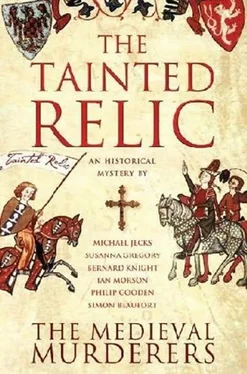‘What?’
‘If the holy relic-whatever it is-is so great a prize, then why do we not know of it? Why does the abbey not display it with joy and attract a multitude of pilgrims? And why did John Barley wish to offload it on to the feretarius of St Frideswide’s? With whom he did not have an exactly fraternal relationship.’
‘That is a very good question, Regent Master Falconer.’
Another voice cut into the men’s conversation. Falconer looked over Bullock’s shoulder to see Peter Talam, the bursar of the abbey, entering under the soaring archway that led into the scriptorium. His bustling walk raised dust motes that sparkled in the shafts of light crossing the room.
‘I heard a whisper of just such a relic a number of years ago. Apparently the translation from Tewkesbury to the abbey was effected over thirty years ago. Well before my time, I might say.’
Falconer invited Talam to sit on the stool next to himself and Bullock. But the restless bursar paced backwards and forwards, continuing to raise dust around his heels.
‘Being responsible for the funds of the abbey, I was of course intrigued by the story of a relic in our possession. Especially as it was said to be a piece of the True Cross with Christ’s blood on it. I even asked the abbot about it. This was more than ten years since. But he would say nothing. Neither confirming nor denying the story. And I could tell by his look that I was expected never to raise the question again. So I didn’t.’
Falconer could well believe in Talam’s discretion. He was stiff, but a dedicated servant to the abbey.
‘But someone else did, and recently.’
Falconer recalled the brief snatch of conversation between Abbot Harbottle and the master mason that he had overheard. La Souch had clearly heard the story about the relic himself. He had also got the same short shrift from Harbottle that Talam had received ten years earlier, when he had asked about it. But the effect on the abbot had been devastating, as Falconer himself had witnessed. He realized that Bullock was looking at him with curiosity etched on his face. It was Talam who spoke, however.
‘Eudo La Souch asked the abbot about the relic?’
Falconer nodded.
‘So the mason did know about the relic, but did not possess it.’ Bullock was chagrined he hadn’t seen it. ‘Could he have known its location?’
‘I think not. Or he would not have still been here. He would have…what is the expression?…’ Falconer smiled contemptuously. ‘Translated it.’
Talam pursed his lips in disapproval. The translation of a saint’s remains or any other such relic was in some people’s eyes a euphemism for theft. But those holy people who effected the removal of such relics, sometimes without the owner’s approval, were seen to be merely responding to the demands of the saint to be relocated. To be carrying out a furta sacra -a holy theft, or translation. But he had to admit there was truth in the man’s deduction. If Eudo La Souch had somehow located the relic’s hiding place during the rebuilding work, he would have disappeared as soon as he had been able to remove it. It did still leave the question as to why such a valuable relic had been hidden in the first place, though. The same difficulty had occurred to the constable too.
‘But why hide such a venerable object?’
Talam sighed, and for a moment ceased his endless pacing.
‘Only the abbot knows that. And he’s not telling. If only we knew who the monks were who trans…’ He looked Falconer squarely in the eye, and chose his next word carefully. ‘…brought the relic here. Unfortunately, Brother John Barley was the last of that generation. Apart from the abbot himself.’
Falconer suddenly recalled the abbot lamenting the deaths of several of his colleagues. Now it had a meaning. Sitting as they were in the vast room where texts were copied, and records of the abbey’s life were written, Falconer had an idea.
‘Tell me, Brother Peter, did all those of John Barley’s age die a natural death? I mean, due to advanced years?’
Talam looked puzzled.
‘I don’t know what you mean, Master Falconer. Over the years, many canons have passed over to the Heavenly Jerusalem after a full life of prayer.’
‘But, in recent years, have there been deaths among the older canons not due to the natural process of time? Apparent accidents, perhaps?’
‘There have been some, of course. Just before I came here, I believe there was a brother who ate a poisonous plant accidentally. As for others, I cannot say. Brother Thomas was killed by robbers on the road returning from Glastonbury seven years ago. But these are perfectly normal occurrences in the dangerous and lawless world in which we live.’
‘Perhaps, Brother Peter. Perhaps. But if John Barley was killed for the relic, perhaps others have died because of it. Would you be so kind as to show me the abbey chronicles anyway?’
‘Going back how long?’
‘Let’s say twenty years. To start with.’
Falconer was soon settled down with the records that Talam provided. But, though he seemed content to plough through them, Bullock could not face the thought of sitting with dusty tomes for hours on end. Reading old documents concerning past history was not his idea of pursuing a murder case. Future success required vigorous and decisive action. Besides, he still had his suspicions about Yaxley, the feretarius. He decide to return to Oxford, and winkle the truth out of the man.
And if that didn’t work, there was always the Templar.
It was taking Falconer a long time, but a pattern was beginning to emerge. Starting with a monk twelve years earlier who had died as a result of falling masonry occurring during the building of a section of the great abbey church. The appropriately, if unfortunately, named Brother Benedict Mason had died instantly. One year later it was the turn of the monk Talam had recalled, who had died shortly after eating his dinner. Brother Ralph Durward had been found stone cold, and blue lipped, when he had failed to answer the call of the first bell of the day. The cook had been mortified when it had become apparent that an excess of digitalis had found its way into the monk’s food. He could offer no explanation for the error. And just as Talam had said, Brother Thomas Dyss had been killed on the road just west of Oxford, barely three miles from the sanctuary of his abbey. He had made the long journey to Glastonbury and back without mishap, only to be stabbed to death almost on his doorstep. Robbers on Standlake Common had been blamed. Between these three incidents six other canons had died, though most of old age or disease. The only other death that attracted Falconer’s curiosity was that of Brother William Hasilbech. He had been found on the road north of Oxford with the marks of horses’ shoes imprinted in the bruising on his body. His head was crushed, as if by the flying hoof of a horse. But this was during the lawless times, when the barons had fought the King. There had been much traffic of armies hurrying thither and yon. It could even have been the King himself, or his son Edward, who had carelessly ridden down the monk one dark evening. Both had been in the vicinity of Oxford at the same time. Falconer recorded it as a possibility in his search for a pattern of deaths.
It was another hour, and by candlelight as night closed in, before he found the final suspicious incident. Brother John Paston had gone into the church during a violent thunderstorm one night a year earlier, and had been discovered only the following morning, with a chewed-up scroll blocking his mouth. He had choked. It had been supposed that Paston, a deeply devout if rather difficult individual, had been emulating the command of the mighty angel in Revelation, who, to the accompaniment of seven thunders, adjured John in the following way. ‘Take the scroll, and eat it. It will turn your stomach sour, though in your mouth it tastes as sweet as honey.’
Читать дальше












